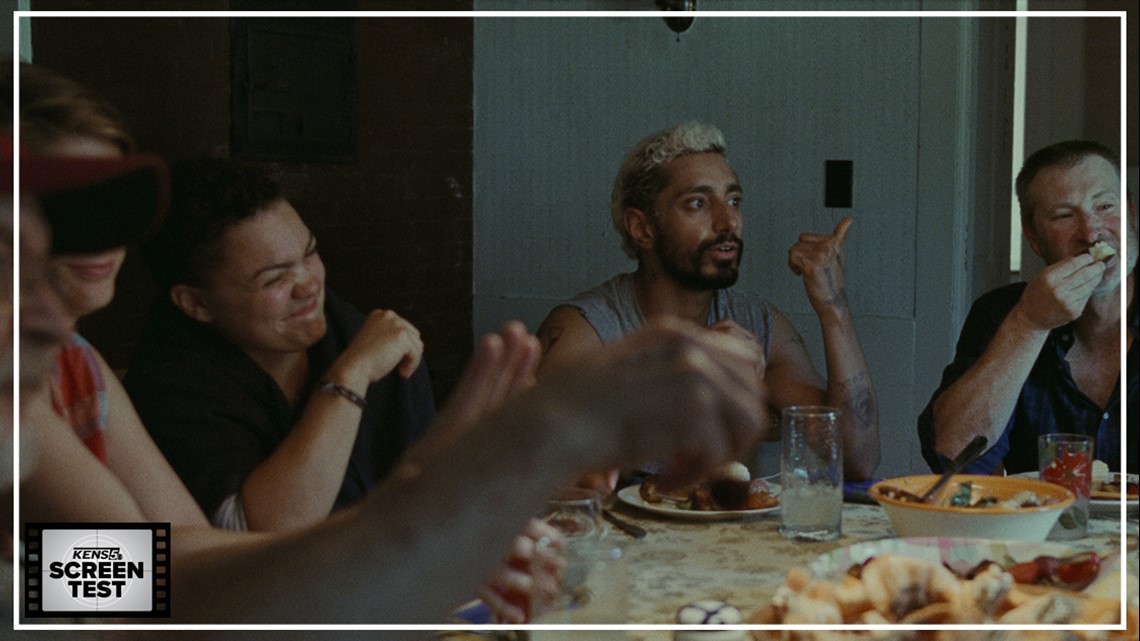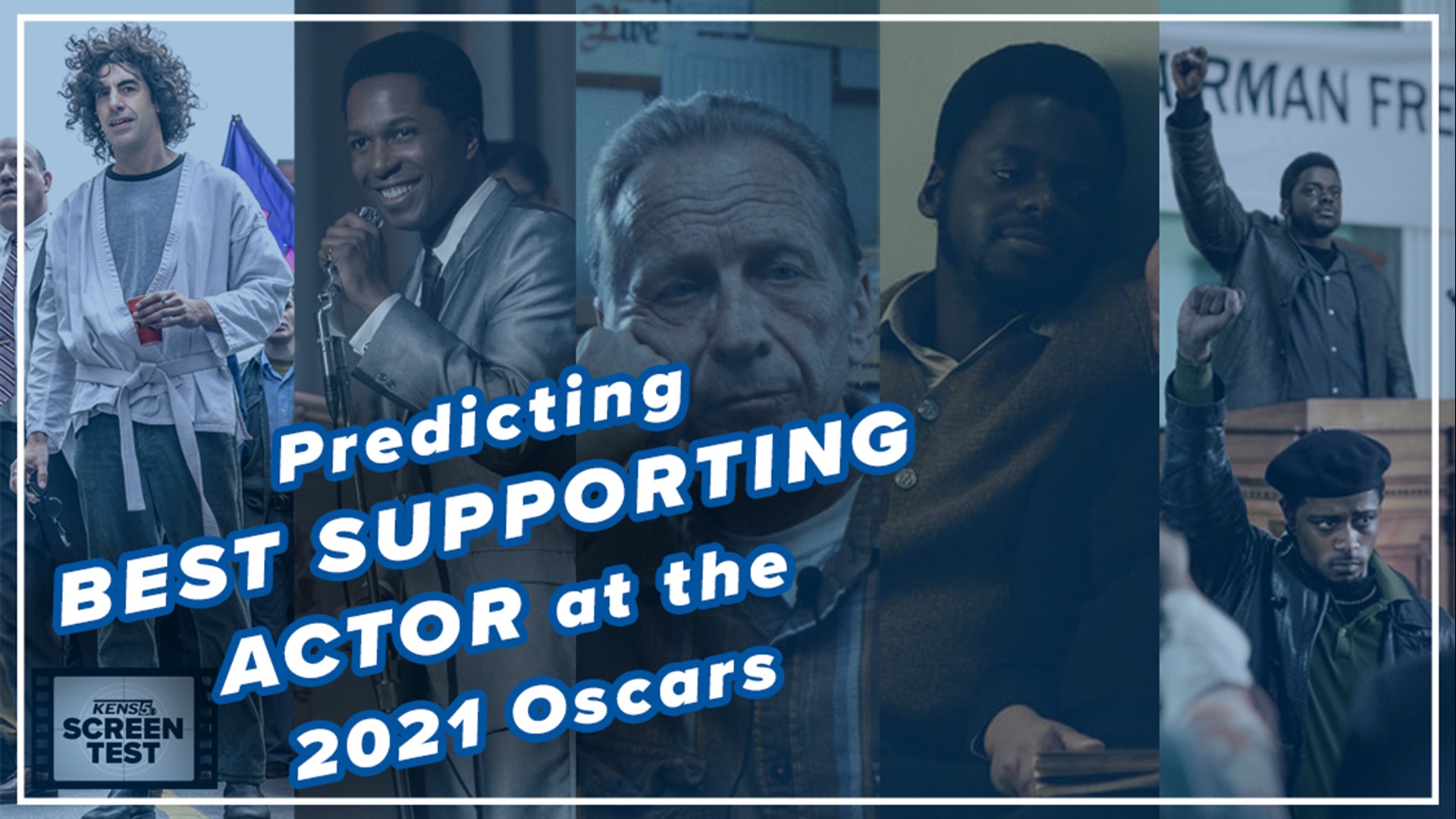It’s curious that British actor Riz Ahmed isn’t a bigger star than he is. Sure, he’s been granted his rotations through the franchise machine playing secondary characters in “Rogue One,” “Venom” and “Jason Bourne” while keeping busy with smaller projects, but there hadn’t yet been that role which fully realized the Emmy-winning promise Ahmed teased when he played a wrongfully arrested college student with arresting subtlety in “The Night Of,” the 2016 HBO miniseries that served a captivating argument for Ahmed’s ability to do more with his Pluto-sized eyes than most actors can do with an entire awards reel-calibrated monologue.
“Sound of Metal” finally makes good on that promise. In Darius Marder’s stunningly conceived and emotionally gripping drama – starring Ahmed as Ruben, a platinum-blonde, sleeveless shirt-wearing rock drummer who loses his hearing – those eyes are marble pools of hurt before becoming a source of recognition and then, finally, a window into a soul caught up in reckoning. The brilliant thing about Marder’s debut feature (he previously directed the 2008 documentary “Loot” and penned the intergenerational drama “The Place Beyond the Pines”) is that while it’s a display of filmmaking that some might appropriately refer to as “restrained” in the ways it emerges as showcase for Ahmed’s natural pent-up angst and Ruben’s furious release of it, it’s actually driven by stylistic maneuvers that are as subtle and impactful as Ahmed’s turn. The first and simplest of indications about the ideas behind Marder’s screenplay (a collaboration with brother Abraham, and based on a Derek Cianfrance story) is a choice that ostensibly runs counter to the premise’s foundations: Aside from a handful of scenes explicitly showcasing it for narrative purposes, “Sound of Metal” doesn’t boast a musical score. Instead, over the course of two hours, we become accustomed to hearing the whispers of wind, the chirping of birds, the tactile clasping and forming of hand signals during sign language communication, and, occasionally, the silence that only at first is an ominous representation of Ruben’s encroaching deafness. “Eliminate all exposure to loud noises” is the early advice given to him, and the movie’s immersive soundscape – from stillness to distortion to everything between – is reflective of that creed in shaping “Sound of Metal” into one of the year’s best films and one of the medium’s most innovative filmmaking exercises.
In a story that’s emotionally penetrating in its frankness, the cataclysm comes suddenly for Ruben. He’s sifting through records alongside his partner in life and on the stage, Lou (Olivia Cooke, sporting bleached eyebrows and the scarred arms of a character with her own personal struggles), when the movie startlingly drops ambient chitchat for a ringing dullness, as if plastic wrap has tightly encased our senses; it’s a taunting sensation that’s almost worse than total silence. If the movie’s opening concert sequence shows that heaven for Ruben is auditory hell, then the natural anxiety that Ahmed naturally projects makes the implications undeniable as sound continues to slowly fall around him in the middle of a later show, before he rushes out through quiet crowds and breaks down into sobs his brain can’t register anymore.
What’s refreshing and imperative to “Sound of Metal” as a film that explicitly welcomes the viewer into the surface layers of what it’s like to live with a disability is that the sequence described above is stripped of the melodrama that you might expect just from reading about it. Urgency is communicated without being stretched to helplessness, and Marder emphasizes that priority by carefully making it the driving force of the story. It’s unfortunately all too easy to imagine the Hollywood machine getting reckless with a story that places the effects of a physical disability front and center (largely because Hollywood’s history is rife with the kinds of movies that end up only othering the community they are spotlighting) and so Marden’s film becomes a delicate act of subversion. “Sound of Metal” isn't an overwrought tragedy but a wise character study, and it’s analogous with Ruben’s mindset as he advances, with self-destructive impatience, toward coming to terms with the fact that he isn’t a victim of broken circumstances, but an occupant of new ones.
Helping him (and the open-minded viewer) to realize that reality is Paul Raci’s endearing and soft-spoken Joe, the leader of a deaf community that Ruben reluctantly joins while Lou briefly heads home to France. Clear foils to each other in attitude and appearance, Joe and Ruben may as well represent opposite ends of the spectrum through which those with disabilities may be viewed. But “Sound of Metal” doesn’t stray into confusion about where it stands; the project employs deaf actors as the denizens of the in-movie community who help the film form a naturalistic verve while closed-captions – a rarity for English-language U.S. theatrical releases – signal an embrace of audiences who are hard of hearing (the point at which subtitles begin to appear for ASL-driven scenes also parallels how far Ruben has come). “You don’t need to fix anything here,” Joe insists to Ruben at one point, and the line takes on extra weight when you consider Raci is the child of deaf adults; “Sound of Metal’s” triumph is how it gives acceptance its own narrative arc at the same time as it refutes a bumpy history of disability-centered stories. The gentle cinematography of Daniël Bouquet weaves compassion and care into the contours, and the dramatic impetus is that the audience recognizes compassion from Joe long before Ruben allows himself to. It’s even more striking how “Sound of Metal” directly eases into themes of addiction and mental health, refining what’s at stake for Ruben with a gentle hand without falling back on tired tropes.


Some of the most captivating scenes in “Sound of Metal” center on Ruben’s regular trips to a local school for deaf children, where he goes from being a nervous visitor to adjusted presence as he ostensibly begins to find his way forward. In these moments in particular, the proceedings almost come to feel like a work of verité documentary; decisions are acted upon before the audience sees them discussed, and the effect is a slightly interrupted flow to the movie’s pacing before we realize the intentionality behind it. We couldn’t possibly be with Ruben in every step of his transformation. It’s a particularly smart touch by the screenplay, and an uncommon concession from the movies that the most resonant way the audience can appreciate a character’s journey is from a distance. At the same time, “Sound of Metal” goes through patterns where it envelops us within Ruben’s soundless perspective before the sensation returns for us once again; this isn’t a silent film, but its technical collaborators encourage the viewer to consider sound in deeper and more meaningful ways that very few movies ever have.
As does Ruben. The second half of the picture becomes a more complicated one in this regard, as our protagonist quietly begins to take matters into his own hands and “Sound of Metal” instructs that the path to self-acceptance isn’t the same for everyone who takes it. Tangential characters become more dynamic and relationships that were previously only alluded to come to the fore, and Ruben’s slowly swirling internal maelstrom is accentuated in a masterfully directed scene where inevitable realizations are magnified to such a devastating tenor that it feels like we’ve lost another of our senses, one associated with cinema itself—that of lingering strands of hope, the dwindling possibility of escape. Ruben doesn’t admit it to Joe until after he’s decided to act on it that that hope of escape still resides within him. But there’s no faking his way through overcoming; plans can be blindfolds, and they end up restricting Ruben even more.
For as ostensibly straightforward a story as this is, it’s also imbued with a thoughtfulness and honesty that pierces through the assumptions we may bring into it. And wherever you decide to watch “Sound of Metal” (it’s in theaters now, and hits Amazon Prime on Dec. 4), Marder’s accomplished debut deftly underlines the irony of cinematic absence leading to the discovery of something that’s always been there, and at the same revelatory moment that Ruben does: There’s a beauty in new perspective, and a broader horizon on the edge of it too.
“Sound of Metal” is rated R for language throughout and brief nude images. It’s in theaters now, and starts streaming on Amazon Prime Video Dec. 4.
Starring: Riz Ahmed, Olivia Cooke, Paul Raci, Mathieu Amalric
Directed by Darius Marder
2020
OTHER SCREEN TEST REVIEWS
- ‘The Twentieth Century’ Review: The most absurdly demented movie of 2020
- ‘Run’ Review: You’ll be way ahead of ‘Searching’ director’s frustratingly neat new thriller
- ‘Ammonite’ Review: Kate Winslet, Saoirse Ronan star in deceptively simple tale of budding seaside love
- ‘The Climb’ Review: An unconventional bromance stings with its comedy, languishes in its drama
- ‘Let Him Go’ Review: A multi-toned neo-Western that veers between soulfulness and explosiveness
- ‘Kindred’ Review: A finely crafted, vaguely familiar thriller that would make Edgar Allen Poe proud
- ‘Holidate’ Review: Emma Roberts, Luke Bracey star in Netflix’s sardonic attempt at subverting Hallmark Channel sentimentality
- ‘On the Rocks’ Review: Sofia Coppola’s familial drama finds casual tenderness in fractured connections

